#david pajo
Text
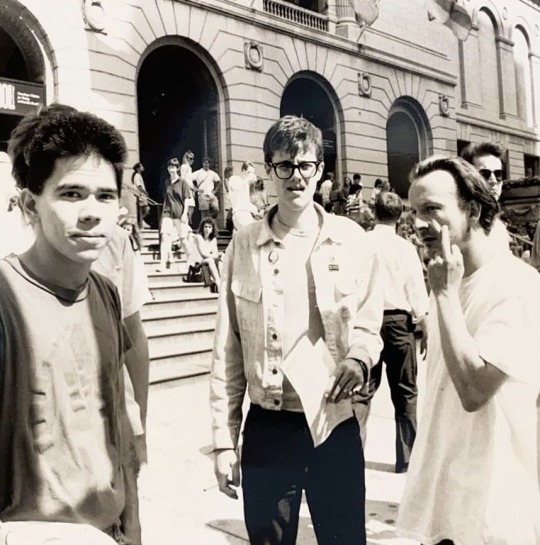
David Pajo, Britt Walford and David Yow, Chicago 1989
Photo by Shannon Smith
47 notes
·
View notes
Text
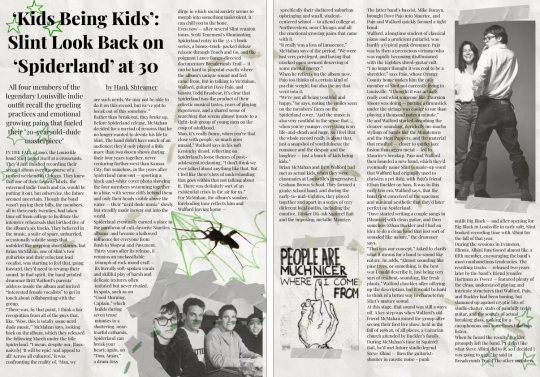
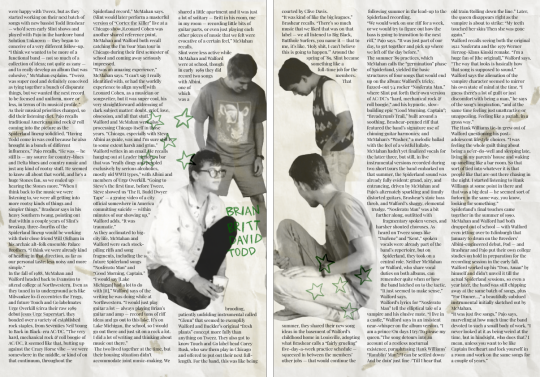
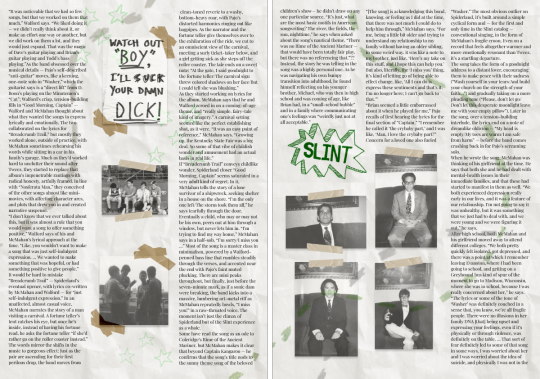
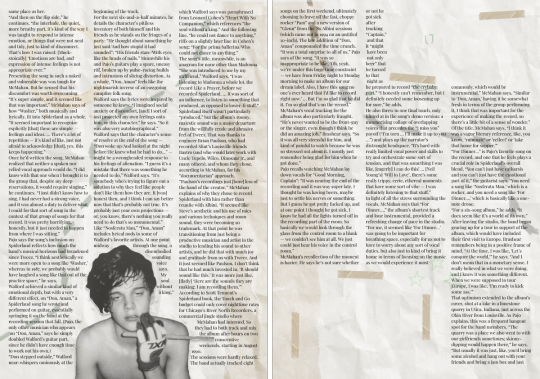

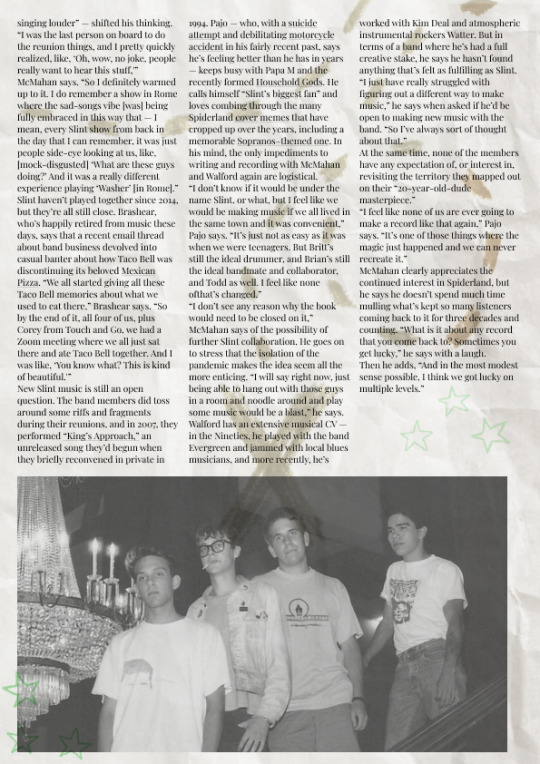
Layout Redesign for :
Kids Being Kids’: Slint Look Back on ‘Spiderland’ at 30
Not my original writing, the layout is simply a collage of pictures online, and drawn assets I made in clip studio.
Done in Figma and Clip Studio Paint
2023
#art tag#clip studio paint#iloveitback#slint#spiderland#britt walford#david pajo#todd brashear#brian mcmahan
7 notes
·
View notes
Text
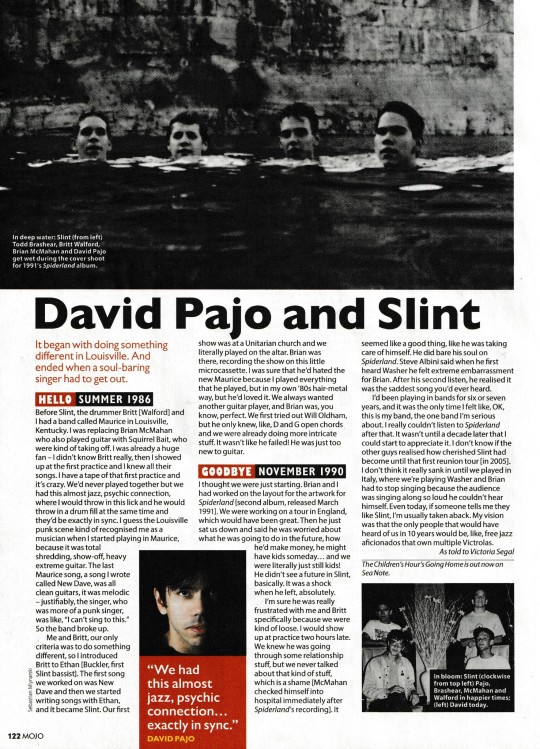
2 notes
·
View notes
Text
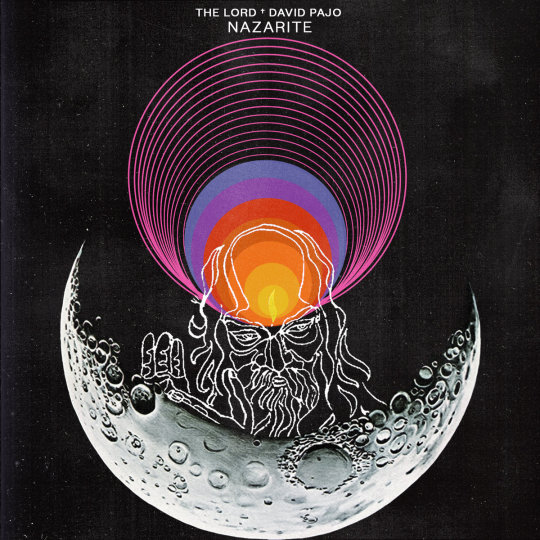
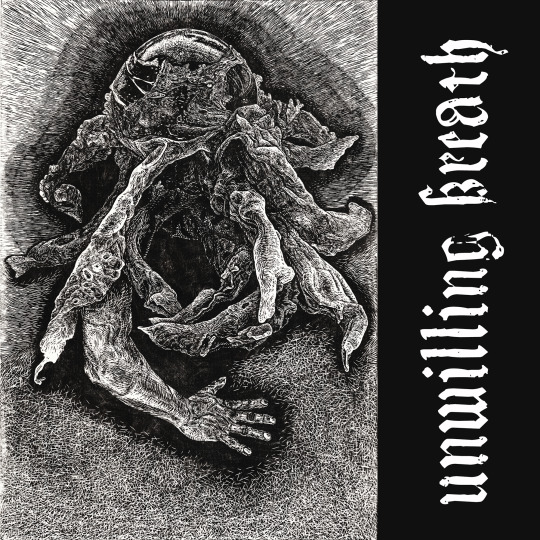


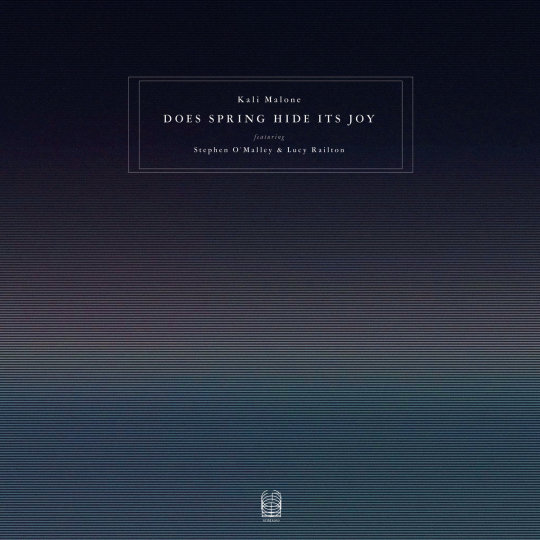
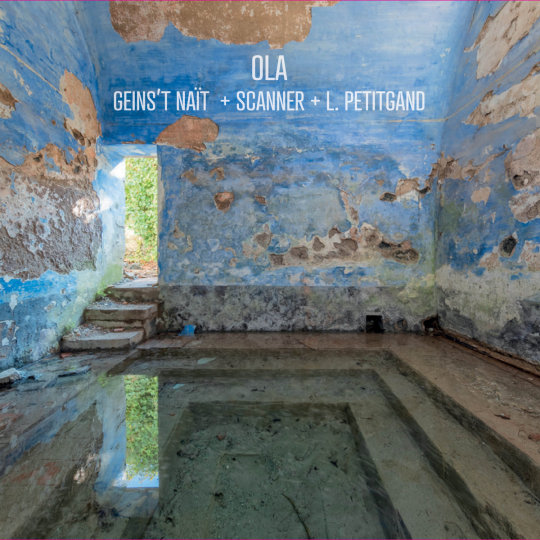


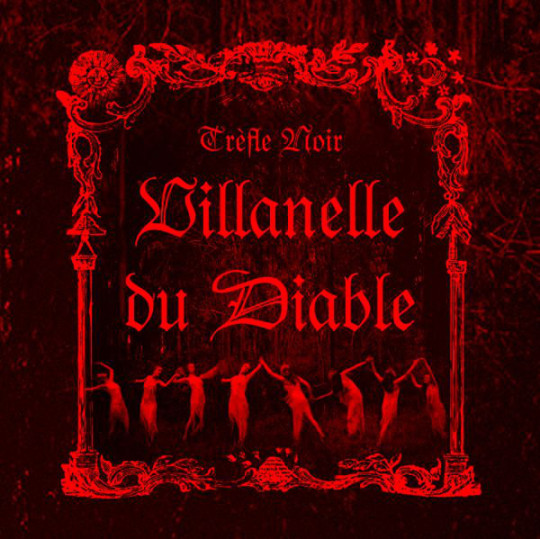

My albums selection for the next week:
The Lord & David Pajo – Nazarite
Unwilling Breath - Tower of Nails
Delphine Dora Ft. Pacôme Thiellement – Un Monde Sans Dehors Un Dehors Sans Monde
The Legendary Pink Dots - Only Dreaming
Kali Malone Featuring Stephen O'Malley & Lucy Railton – Does Spring Hide Its Joy
Geins't Naït + Scanner + Laurent Petitgand - OLA
Manja Ristić - glasovi voices
Céleste Gatier - Fragments pour dominer le silence
Trèfle Noir – Villanelle du Diable
Frank Zappa – Lumpy Gravy
#musical sugestion#musical selection#the lord#david pajo#unwilling breath#delphine dora#the legendary pink dots#kali malone#geins't nait#scanner#laurent petitgand#manja ristić#celeste gastier#trefle noir#frank zappa#experimental music#industrial music
19 notes
·
View notes
Text
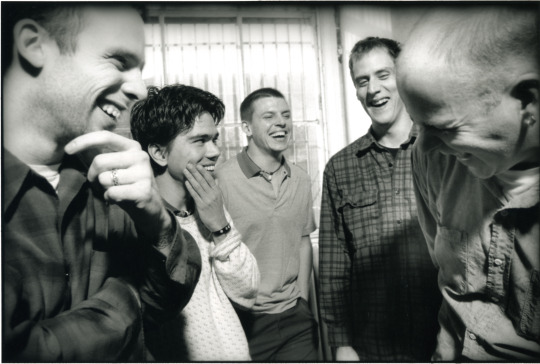
Tortoise - Bimbo's 365 Club, San Francisco, California, May 25, 1996
At some point last month, Drag City made Papa M's Live From A Shark Cage its "Item of the Day" — and I realized that I had somehow misplaced my copy of this excellent David Pajo-masterminded record. I had to get another, and since it was delivered to my door a few weeks ago, I've been reveling anew in its awesomeness. If you haven't heard it, you gotta.
Shark Cage sent me in various Pajo-centric directions — including towards this incredible tape from his stint in Tortoise. You gotta hand it to David, he really had an outstanding 1990s, from Slint to Tortoise to Will Oldham to Stereolab (plus many more solo works and side trips).
On this evening in San Francisco, Tortoise starts out soaring with a gorgeous "Gamera" and pretty much stays at a beautiful elevation for the rest of the show. The groove is extremely strong, whether on the vibe-y "Djed, pt. II" or the lovely drift of "Glass Museum." Then there are two very cool covers — the Art Ensemble of Chicago's "Theme De YoYo" and Hugh Masekela's "Grazing In The Grass." The latter tune, which closes things out, shows that Tortoise could transform into a very groovy party band when they felt like it ...
9 notes
·
View notes
Audio
Tortoise – TNT (1998)
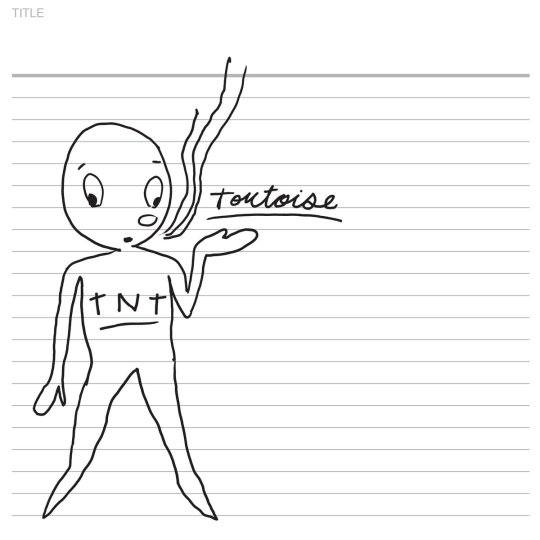
http://www.trts.com / https://thrilljockey.com
#tortoise#tnt#thrill jockey#post rock#rock#indie rock#douglas mccombs#john herndon#dan bitney#john mcentire#david pajo#jeff parker#rob mazurek#roger seibel#sara p. smith#julie liu#usa#popahna brandes#1998#1990s
5 notes
·
View notes
Text
The Children's Hour Interview: The Right-sized Clothes
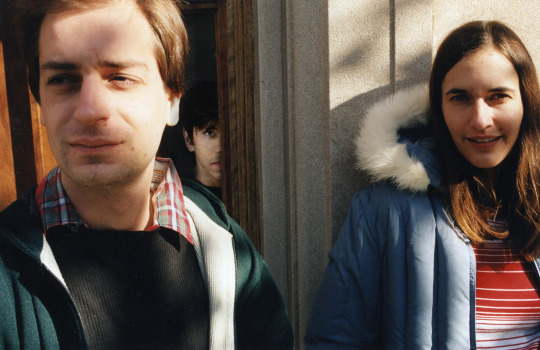
Photo by Dan Osborn
BY JORDAN MAINZER
As guitarist Andy Bar is figuring out his preferred Zoom settings, the rest of The Children's Hour are talking about animals. David Pajo's impossibly white cat Snowball has joined the picture. Josephine Foster shares a recent dream she had where she had acquired a similarly white, fluffy dog. Pajo reminisces on playing with Superwolves for actual wolves at a sanctuary in southern California. Foster remembers a time she played a show for donkeys in Spain; two of them copulated during the set. The band continues to share unique life experiences--wildlife-related or otherwise--that, were they merely the versions of themselves who had made the album we're about to talk about, even they wouldn't believe.
In what is currently being immortalized in a Bar-drawn comic on the band's Instagram page, the unlikely story of The Children's Hour is as follows: Opera school dropout Foster and School of the Art institute of Chicago student Bar were in a trio called Golden Egg that disbanded before even finishing a song. The two decided they liked writing together, so they continued as a duo, for fun. Foster would craft a song around Bar's written riffs and chord progressions. Eventually, they had some songs, settled on a band named after a Henry Wadsworth Longfellow poem, and played at open mics, bars, and basements around Chicago. They released a self-titled EP, and then an LP called SOS JFK. Legendary venue The Hideout invited them to play a variety show hosted by none other than Zwan. (That was the night they met Pajo, who lent Foster his guitar.) Zwan liked them and asked the very band who at the time were playing tiny venues, to open for them on their tour. In order to fill out The Children's Hour's sound for larger venues, Pajo played drums with them every night. The chemistry then was as palpable as it would be on a Zoom call twenty years later. Though Foster and Bar were set to move from Chicago, they liked their new sound with Pajo, as the now-trio was transforming the old songs and writing new ones. In an effort to capture lightning in a bottle, they recorded with Paul Oldham in Shelbyville, Kentucky.
Over the next twenty years, the band didn't see each other much, and nobody could find the recordings, until Oldham stumbled upon them in his archives. So the three met to mix and master at The Bomb Shelter in Nashville. Pajo asked Drag City--the same label that approached an already signed Foster and Bar that fateful night at the Hideout--whether they'd like to release Going Home, the long-awaited second album from The Children's Hour. That's how we got to where we are, with the album coming out on Drag City tomorrow.
"To me, it's a 20-year-old record," Pajo said of Going Home. "It's a document. I can't comprehend how people will take it." Listening to the record, you can certainly hear the artistic trends of the early 2000s and the indie folk of today it would go on to inspire. The interplay between Foster's wincing lead guitars and Bar's acoustic strumming on "Dance With Me" leads a slightly twee indie pop duet, an anthem for the shy. "Adoption Day", which appeared on SOS JFK, gets a spritely guitar line and coasts along Pajo's bossa nova-esque rhythms. It's also immediately apparent how the band saw their expanded sound. The slow-burning "Rainbow" builds up like Songs: Ohia, while the gentle acoustic strums, wiry bass, and whistles of "Anna"--another rerecord--becomes an upbeat rocker that's closer to that dog. than it is to Joanna Newsom.
Going Home is also a product of the band's inner monologue circa the early 2000s, especially Foster's, as she was living in a major city following upsetting events both personal (a breakup) and collective (9/11). As such, there's a sense of urban loneliness that pervades the album. Foster yearns for the wilderness on "Anna" and "Wyoming" and pokes fun at celebrity culture on "Leader Soldier". Breezy lead single "Bright Lights" is nonetheless dark, like a diary from someone's final hours on Earth. And the title track, which Foster describes as an "old-fashioned pop song," sees her screaming her words of devotion, something that could cause current devotees of her arty folk to double-take.
As it happened between albums one and two, however, songs of The Children's Hour have the potential to grow, to take on a life of their own. They'll be playing at the Hideout on March 26th, with Sabrina Rush on bass, filling out their sound even more. "Music isn't limited by things like time," Pajo said. "One could argue no music is ever finished. You could always pick it up again. There's certainly some music I'm happy to leave behind. But The Children's Hour never felt resolved. Even now, it doesn't have to be a resolution. It's got new legs."
Below, read my conversation with Foster, Bar, and Pajo, edited for length and clarity.

Andy Bar's album art
Since I Left You: A few of the songs from The Children's Hour EP and SOS JFK ended up on Going Home, rerecorded with David. When you recorded this, with a mix of new songs and old songs, were you trying to see what you had with the three of you as opposed to just the duo?
Josephine Foster: I feel like we had made our first record in sort of a rush and weren't very comfortable with the recording process. It was a lovely opportunity, but we had never done any recording in the studio or had a label. Everything felt a little unnatural, if that makes sense. It was formative to...tour with David, for me, because it felt like we finally had the balance. The songs felt in their natural position. The new songs came forth, and everything started to feel confident and make sense. The reason we made an EP first was it was a lovely introduction to this label, Minty Fresh, but we were a really new group. We were very casual. All these things happened to us swiftly, but we hadn't really had a lot of time as a band. It was just our little friendship and fun project. I hadn't sung in a microphone before. Scarcely.
David Pajo: Wow.
JF: I didn't know how to use headphones. I was trying to find my voice after opera singing. I was super self-conscious. We went to the studio, and the gentleman from the record label was well meaning, and not that he was ordering us what to do, but he was an authoritative presence. I was like, "What is this? I don't get it." I felt super nervous the whole [time]. Then, we brought in a couple drummers we had never played with. Our friend came and played bass. [We used] a click track. All of it was new to me. I didn't know Andy as well. Honestly, I never listened to records, really, in my life. I listened to classical music. When you're starting out, you don't know because you've never tried. We made the record, but it was a patchy conglomeration of these sonic experiments. For me, [the songs on the debut are] kind of a prequel. I don't even regard them as finished products. When we met David and played them on tour every night, then we became a band. Then, when we [were making Going Home], we thought, "What are the songs [best] for this trio?" It didn't matter if we had recorded one or two of them on an EP or the [first] record. That was like the wrong-sized clothes.
DP: How did [your experience with the first engineer] contrast with the engineer we worked with?
JF: I never worked with someone again who sat there as a producer in a concept role. I was really uncomfortable with that. I know it's very typical.
DP: Hearing yourself in a microphone, especially with everything you went through, there's no brochure that explains the recording process. Everything sounds so sterile and gross.
JF: It's totally sterelized.
DP: It's really a jarring experience entering a studio like that for the first time, with all these strangers telling you what to do. I'm glad that the Shelbyville recording was the opposite. It was super relaxed. It wasn't labored at all.
JF: Just live in a room together.
Andy Bar: I don't think we did that many takes of any particular song.
SILY: Does Going Home feel like your debut album, then?
JF: To me, it does. When you make a record, you want to listen back and say, "Yes, that's what I want to hear." [laughs]
DP: Also, I think having the digital files transferred to analog tape and mixed analog brought out the best of the recording. It makes it a really pleasing listen. I listen to it all the time. I almost never listen to the records I played on for enjoyment, because I can't objectify myself and separate myself from the recording. [Going Home], I'll put it on, and it changes the atmosphere in the room for whoever is present, even for my kids or anyone who has never heard it.
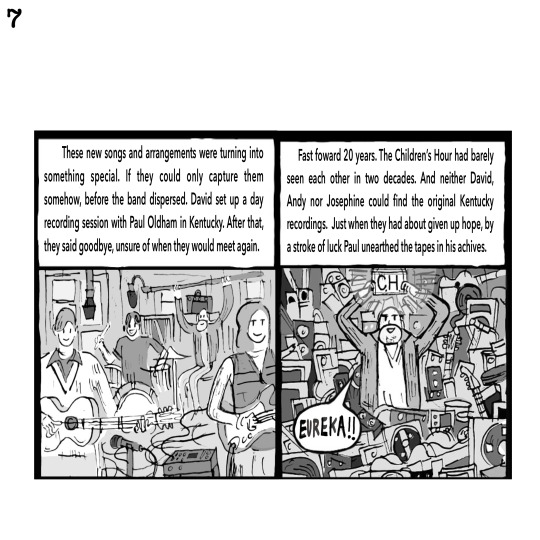
Bar's comic
SILY: You've said this record is a moment in time. Since this was recorded twenty years ago, you've all released a large number of records, especially Josephine. When you listened to these recordings for the first time after twenty years, were you immediately transported back to when you recorded them?
JF: I was transported back. I felt a sort of longing to share it. There's no smoke and mirrors. There's no studio tricks. It sounds good.
AB: When I was listening to the old stuff for the first time in a while, it did transport me back to the band that I remembered.
SILY: When I listen to it, I definitely hear the sound of other music at that time, not to say that if this was recorded in 2024 it would sound out of place. Maybe this is hindsight, but it sounds like a record from the early 2000's. For someone my age, that carries a ton of nostalgia. It's a formative era in music for me. Do you remember what inspired a lot of the lyrics and narratives at the time?
JF: There are several songs where the lyrics are about living in the city. That was towards the end of all of us being in Chicago. Andy and I, not long after, maybe within the year, moved. After [our tour with Zwan], we didn't do a whole lot. I was in other bands. I was feeling that the city, as much as I love it, was not my habitat. So there's a song about leaving Chicago, called "Rainbow", that's directly about leaving town. "Anna" is about going to live out in the wilderness alone, without a boyfriend.
DP: What's "Going Home" about?
JF: "Going Home" is an old-fashioned pop song, not too specific. "Are you going home, my darling? / Wait for me." A classic folk pop song.
DP: The eternal drama.
JF: The longing for home. "Leader Soldier", however, was a little tied into the idea of fame. That's a lyric that's a bit joking, a satire. "Hey there celebrity, lost your anonymity, cannot do so easily, the things you used to do. Can you walk in company of idleness or frivolity / Can you maintain your privacy?" or something like that. "And we can tell by your color you are of the highest order / You are now a leader-soldier." The absurdity of elevating one person over the other.
DP: The weirdness of notoriety or fame. That's super cool. I didn't realize [that's what it was about.]
SILY: You mention specific places like Chicago and Wyoming on the album, which gives a specific sense of time and place. There are also some narratives, like "Adoption Day", versus something that's more intentionally vague or universal. Was that contrast, between specific and universal, something you consciously put into the songwriting?
JF: When we first were together making songs, it was very therapeutic. We had been in a band with my ex-boyfriend, and there were all these dramas and breakups, and Andy and I stayed friends, so we thought, "Let's just play music together. A gentle place where there's no pressure." We both realized we had this thing in common: He had all these foster kids in his house, and I grew up with adopted kids. We made this song about adoption, because we were thinking of all of these themes of innocence and experience. It's a very bizarre song, in a way. The lyrics are from the point of view of me when I was adopted by my father. "Happy are we / Now we are three / A family / Mother, father." Andy would come in with these hooks, an atmosphere, and I would think, "What is this conjuring up?" I'd try to find a lyrical theme, which I hadn't done much of in my life, working with someone else's raw materials. I find it very hard. Andy's got such a beautiful, colorful, rich ideas as the compost. What do you remember about "Adoption Day", Andy?
AB: I was excited when we decided [to write about] what Josephine was talking about, because it was personal and special to me. My parents were foster parents who took care of a lot of kids.
SILY: "Adoption Day" is one of the songs on both records. I don't know whether this is merely a product of David joining, but the huge difference to me between the records is the use of dynamics on Going Home. There's a little bit of that on SOS JFK, but I was really taken by it on this record. Can you talk about the main sonic differences from your perspective?
JF: I feel like that record was sort of demos that were being supervised by some manager you don't know. There was a stiffness that loses the coherence [from splicing takes.] I don't do that at all anymore [when recording;] I just listen for the best take. We'll look for the most interesting blemishes. David is so musical and dynamic, he's feeding this brilliant energy, this thing that gives life. His presence is transformational.
AB: He just added so much. There were new songs like "Dance With Me" that we were working on that we couldn't have done without the confidence we gained on the tour and playing with David.
DP: You go from playing the Hideout to on tour with Billy Corgan. It's intense. I feel like I had the best job of all. There was the songwriting collaboration and the relationship between you guys and just the vibe. In that time, I was living in a really jaded, music business-oriented way I'm really happy to never have seen again. Children's Hour was this ray of hope and light. I felt like my job as a drummer was just to stay out of the way, almost to just be a metronome. To not caricaturize the dynamics just because we were going to be on bigger stages. Just keep it steady and quiet. I could lay into it a little bit more [live] to wake people up because they get bored and fall asleep easily. [laughs]
It was really perfect. It was done with zero ambition. It wasn't like, "We have to make a record with pop songs and make everything hi-fi." It was, "Let's record what we have because we're not going to have much time after this." I guess we knew that we were all going our separate ways afterwards or had seen we didn't have time to play together. The recording seems really light-hearted and pure in that way, too. It's what I needed at a perfect time for me, personally. Music that comes from a pure place to center me again so I'm not distracted by the garbage that comes along with being a musician. [laughs]
SILY: It's come full circle: You're playing at the Hideout next month! What's the experience been like trying to "adapt" these songs to the live stage? Are you playing songs from the first record in addition to this one?
JF: That's a very good question.
DP: I don't know if we've even gotten that far yet.
AB: We're at least playing most, if not all of the songs on the new album. From there, we'll decide how to fill out the rest of the setlist.
JF: Andy's a standup comic, so he needs to start getting some jokes ready.
DP: That's a great idea!
JF: Sabrina will be playing, so we'll be able to have David's wonderful bass lines represented live. That will be the first time we'll have heard it all live in that sense. That's the only thing we didn't record live. David put the bass lines on [separately]. I think it was in the same session, though, so it was all coherent to that moment.
DP: My idea was to put bass on all the songs. I was like, "You know what, I might have to come back to this." 20 years later, I came back to it. They were all complex to me.
JF: It was just "Rainbow" that you put bass lines on 20 years later, right? Like a little cherry on top.
SILY: This might be premature, but do you think you'll write new songs together?
AB: We're definitely gonna jam with each other and be creative together. You don't know what will come from that, but that's how we are.
DP: Relearning the songs is going to be the priority and take up most of my time. Once we're at that point and confident again, it doesn't seem like anyone's against learning a cover song or playing new songs.
SILY: What's the background behind the album art?
AB: In my head, it took place in the Hideout. It's the best I can remember, an image of playing a random club in Chicago.
DP: There's no pictures of the three of us together. You were actually drawing from memory. It's really cool. It's a nicer way than promo photos.
AB: We're relying on our mental photography. I'm also doing comics for this release drawing on our memory.
JF: We ran into this thing where Drag City kept going, "We need a photo of the band!" We couldn't photograph ourselves. We must have been right on the cusp of the digital explosion. I found one grainy photo my mother took of us all that's the only photo of us playing live. We were playing in a massive place. Nowadays, you'd have tons of photos no matter what. We must have been right before that. The Zwan fans were just jamming to us and brought their cameras out later. There's not any documentation of us live.
DP: The Internet hadn't really taken over yet.
AB: There are still pixelated pictures coming out from the time.
JF: Zwan was in the tour bus, and our car broke down after the first show. Some girl lent us her car for the whole tour. She was like, "Just take my Jeep!" We had a big atlas, would look at the city part of the atlas, go downtown, and just ask directions to get to the venue. We didn't have any GPS or anything. When I think about that, it just cracks me up.
DP: There were some soundchecks where you barely made it. You were always on time, but you had just gotten through some huge drive. Did you ever have to leave after the show while Zwan was still playing?
JF: Yeah, to go to a motel closer to where we were playing the next day.
DP: You were thrown into touring having barely played actual rock shows. It's remarkable.
JF: We regarded it as a once-in-a-lifetime thing. We weren't looking for it, and it was probably never going to come again.
AB: You guys were incredibly sweet. Of course, you probably liked our music. I liked you guys personally.
DP: For all the bands that opened for Zwan, The Children's Hour was the only one we always wanted to see and hang out with. It was always a breath of fresh air when you guys were there.
SILY: So what's this press photo taken by Dan Osborn?
JF: He photoshopped David in the doorway!
DP: Theoretically, you could have any drummer. You could photoshop John Bonham in there.
SILY: Or Neil Peart.
AB: I'll photoshop a four-armed drummer in there, Neil Peart and John Bonham.
DP: Or [Def Leppard drummer Rick Allen's] arm.
youtube
#interviews#the children's hour#hideout#drag city#the bomb shelter#going home#dan osborn#andy bar#david pajo#josephine foster#zoom#superwolves#instagram#school of the art institute of chicago#golden egg#henry wadsworth longfellow#sos jfk#zwan#paul oldham#songs: ohia#that dog.#joanna newsom#sabrina rush#billy corgan#john bonham#neil peart#def leppard#rick allen#the hideout#hideout inn
1 note
·
View note
Text
The Children’s Hour — Going Home (Drag City)

The Children’s Hour songs drift in an ethereal hush, pitched, like the Longfellow poem that inspired the name, “Between the dark and the daylight/ When the night is beginning to lower.” Translucent, eerie vocals float above the bashed out minimalism of guitar, drums and bass. The songs sound like the ghost of garage pop anthems, murmuring in haunted corners of a lo-fi pop revival.
The band came out of Chicago in the early aughts, taking shape around the even then distinctive voice of Josephine Foster. The singer, one day to become known for her sepia-toned, old-time folk vibrato, had just dropped out of opera training. Her friend Andy Bar was studying at the Art Institute of Chicago. They joined up in a brash but delicate folk-punk duo and released an EP and one album. This second album, filled out with Slint’s David Pajo on drums and bass, was recorded at Paul Oldham’s Kentucky studio in a single day. Then, for two decades, it was lost and forgotten.
The music drifts into view with “Leader Soldier,” with its slippery, off-kilter guitar motif and Foster’s disembodied singing. The song is garage-rough, but also ephemeral, as if it could float off its moorings at any point and waft out to sea on a breeze. Pajo’s limber bass, his clacking, cut-to-essence drums, does a bit to ground the song, but it remains more or less untouchable. Pajo says of his experience with the band, “I don’t recall how I ended up playing drums with them but I remember how I felt: it was like putting on a gas mask and getting clean oxygen.”
“Bright Lights” is, as the title implies, a bit more joyful and primary colored, its buoyant melody framed by jangling guitars. Yet even here, Foster’s voice is intoxicating in a frictionless, eerie way. Of course there are consonants in these breezy lyrics but it sounds like they are made of wordless “oohing” vowels.
Foster has, of course, travelled on from here, communing with her spectral muse in a variety of contexts, from barest folk to Latin swagger to even, recently, a percolating bed of synths. She sounds especially fresh and pure here in this rough-housing, visceral setting, somehow even more translucent, angelic and spiritual than ever amid the sticky floored vernacular of garage pop.
Jennifer Kelly
#the children's hour#going home#drag city#jennifer kelly#albumreview#dusted magazine#chicago#folk#josephine foster#david pajo#garage#lo-fi
1 note
·
View note
Text


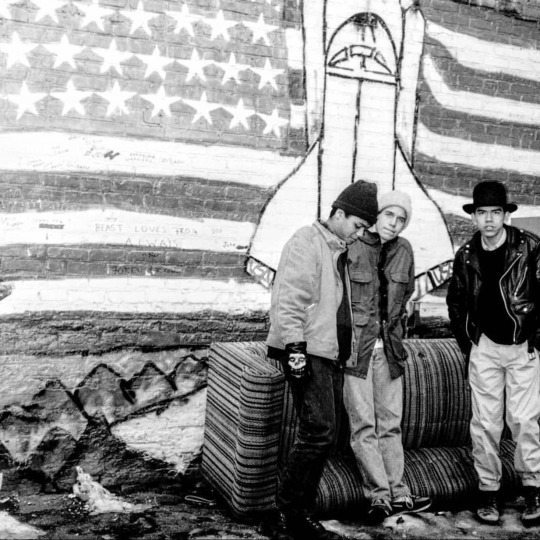
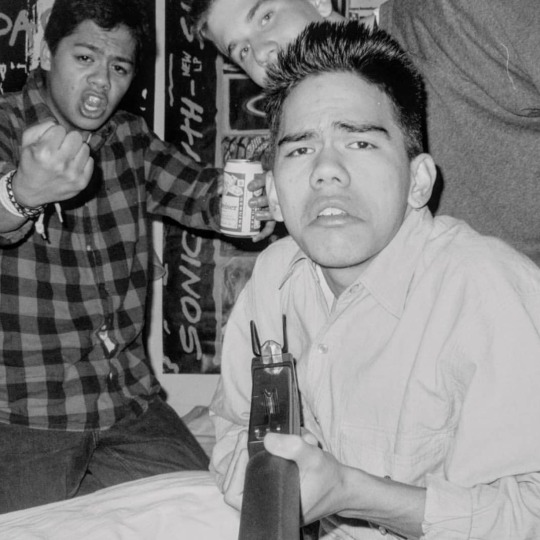
David Pajo, Todd Brashear and Mike Bucayu
Circa 1987-1988
#slint#david pajo#todd brashear#mike bucayu#solution unknown#kinghorse#maurice#papa m#80s#Louisville
17 notes
·
View notes
Text
youtube
Recorded in Bloomington, IN shortly before RSB broke up--for the best r'n'r reason: singer split for India.
#brett eugene ralph#louisville bands#bloomington#todd brashear#irv ross#paul aarstad#david pajo#brother sun sister moon#pigs in zen#doug shawhan#grant barger#india#Youtube
0 notes
Text
youtube
Papa M - Beloved Woman
#papa m#beloved woman#david pajo#will oldham#tara jane o'neil#slowcore#post rock#whatever mortal#2001#Youtube
0 notes
Text
What’s On Michael Portillo’s iPod: Ulrika Spacek
Here at Birthday Cake For Breakfast, we like to get to the heart of what an artist is all about. We feel that what influences them is just as important as the music they make. With that in mind, in the run up to the release of their new album ‘Compact Trauma‘, we’re delighted to have Rhys Edwards of Ulrika Spacek talk us through musical influences.
Words: Andy Hughes
The Tortoise album…
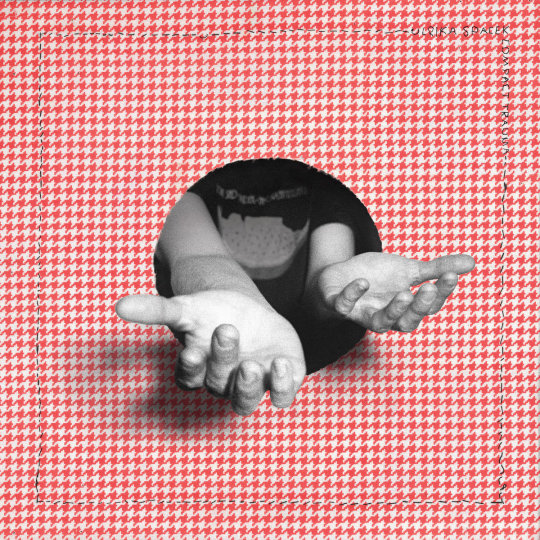
View On WordPress
#Acetone#Acetone 1992-2001#Aerial M#Autolux#Birthday cake for breakfast#Compact Trauma#David Pajo#Dots And Loops#Future Perfect#Stereolab#TNT#Tortoise#Ulrika Spacek#What&039;s On Michael Portillo&039;s iPod
1 note
·
View note
Video
youtube
David Pajo
(via EarthQuaker Devices Meets- David Pajo - YouTube)
0 notes
